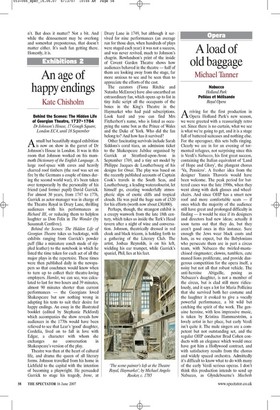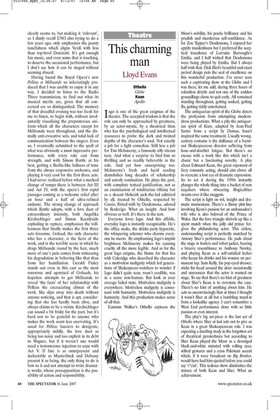A load of old baggage
Michael Tanner Nabucco Holland Park Pelleas et Melisande Royal Opera Arriving for the first production in Opera Holland Park's new season, we were greeted with a reassuringly retro set. Since there is no curtain, what we see is what we're going to get, and it is a stage full of battered suitcases and nothing else. For the operagoer, this sets bells ringing. Clearly we are in for an evening of tormented refugees, not surprising since this is Verdi's Nabucco, his first great success, containing the Italian equivalent of 'Land of Hope and Glory', the plangent chorus `Va, Pensiero'. A fresher idea from the designer Yannis Thavoris would have been welcome. The peak period for battered cases was the late 1990s, when they went along with dark glasses and wheelchairs. And since OHP has a smart new roof and more comfortable seats — if ones which the majority of the audience still have great and prolonged difficulty in finding — it would be nice if its designers and directors had new ideas; actually it soon turns out that they do, but they aren't good ones in this instance. Sure enough the Jews wear black coats and hats, as we expect, but the Babylonians who persecute them are in part a circus team, with Nabucco the twirled-mustachioed ringmaster; clowns, tumblers, cute maned lions proliferate, and provide dangerous competition for the opera itself, a noisy but not all that robust vehicle. The anti-heroine Abigaille, posing as Nabucco's daughter, is not a member of the circus, but is clad still more ridiculously, and it says a lot for Maria Pollicina that she survived both her costume and the laughter it evoked to give a vocally powerful performance, a bit wild but catching the spirit of the work. The genuine heroine, with less impressive music, is taken by Kristina Hammarstrom, a lovely artist in her place, but early Verdi isn't quite it. The male singers are a competent but not outstanding set, and the regular OHP conductor Brad Cohen conducts with an elegance which would once have got him a Hollywood contract, and with satisfactory results from the chorus and widely spaced orchestra. Admittedly it's difficult to know what to do with many of the early Verdi serious operas. I don't think this production intends to send up Nabucco, as Glyndebourne's Macbeth clearly seems to, but making it 'relevant', as I dimly recall ENO also trying to do a few years ago, only emphasises the jaunty tunefulness which aligns Verdi with less than top-level Donizetti. It's got enough fun music, and even some that is touching, to deserve the occasional performance, but I don't see how it can be staged without seeming absurd.
Having found the Royal Opera's new Pelleas et Melisande so infuriatingly produced that I was unable to enjoy it in any way, I decided to listen to the Radio Three transmission, to find out what its musical merits are, given that all concerned are so distinguished. The memory of that dreadful evening was too fresh for me to listen, to begin with, without involuntarily visualising the preposterous uniform which all the characters except for Melisande wear throughout, and the dismally anti-evocative sets, and total lack of communication between the singers. Even so, I eventually submitted to the spell of what was obviously a most impressive performance, with every role cast from strength, and with Simon Rattle at his best, getting a Berlin-like fullness of tone from the always responsive orchestra, and playing it very cool for the first three acts. I had never realised before what a marked change of tempo there is between Act III and Act IV, with the opera's first rapid passages coming as a welcome relief after an hour and a half of ultra-refined andante. The strong change of approach which Rattle adopts, with a love duet of extraordinary intensity, both Angelika Kirchschlager and Simon Keenlyside exploding in rapture, emphasises the willlessness that finally makes the first three acts tiresome. Golaud, the only character who has a character, is the hero of the work, and in the terrible scene in which he drags Melisande round by the hair, much more of one's pain comes from witnessing his degradation in behaving like that than from her humiliation. Gerald Finley stands out even in this cast as the most sonorous and agonised of Golauds, his hopeless attempts to get Melisande to reveal 'the facts' of her relationship with Pelleas the excruciating climax of the work. She slips away into death without anyone noticing, and that is apt, considering that she has hardly been alive, and always claims to be a victim. Kirchschlager can sound a bit frisky for the part, but it's hard not to be grateful to anyone who makes the work seem less enervating. It's usual for Pelleas fanciers to denigrate, appropriately mildly, the love duet as being too noisy and too explicit in its debt to Wagner, but if it weren't one would need a testosterone injection to cope with Act V. If fate is as omnipresent and ineluctable as Maeterlinck and Debussy present it as being, the only thing to do is bow to it and not attempt to write dramatic works, whose presupposition is the possibility of action and responsibility.





















































 Previous page
Previous page